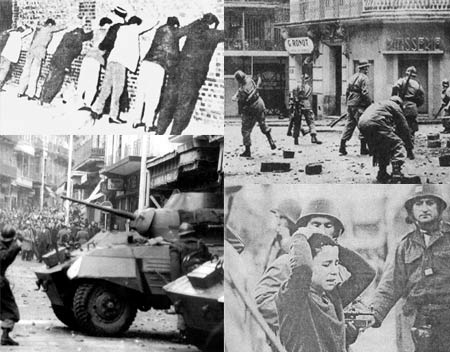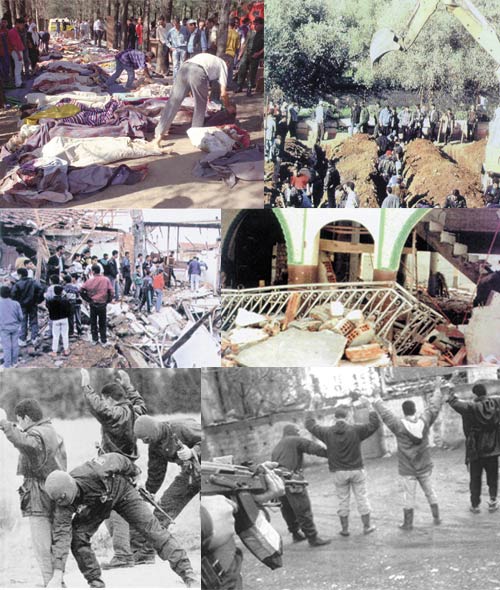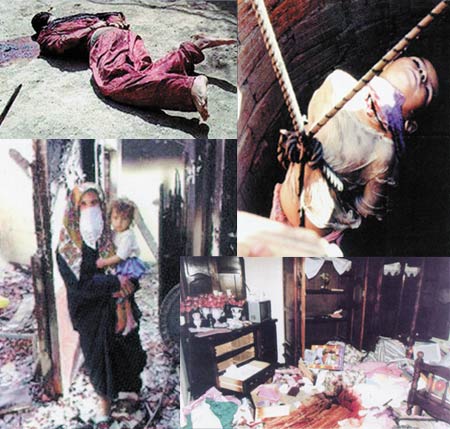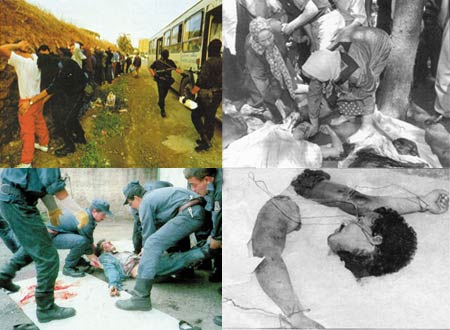 |
Algeria enjoys an important place in the spread of Islam in North Africa, but has been wracked by social and political disorder for many years now. The roots of the conflict in Algeria, which the world has grown used to hearing about over the last decade, go back a long way.
 |
Algeria lived in peace and security under Ottoman rule from the sixteenth to the nineteenth centuries. However, as the Ottoman Empire began to fall apart, colonialist powers divided up the Islamic world. One of these lands was Algeria. In 1827, French armies with 37,000 men invaded the country. In the three years of fighting that ensued, the whole country came under French rule. Algeria was of great importance to the French with its rich oil reserves and strategic position as a port on the Mediterranean. The country officially became part of France in 1830, and remained under the French colonialist thumb for the next 132 years.
In line with the colonialist view, the French saw the people of nations besides themselves as second-class human beings, and so established a system based on pressure and violence, as in all the other lands they occupied. A campaign of cultural assimilation was begun. Firstly, speaking and teaching Arabic was banned. French became the only official language. This policy was aimed at destroying the people's national identity and cultural heritage. Later on, Algeria was made totally economically dependent on France, and the country's political structure was reshaped in line with French interests.
The first Algerian resistance to French occupation came from Abd-el-Kader, the governor of Mascara, in 1832. Thousands of Muslim Algerians were killed in the struggle, and the French took over the whole of the country. Throughout the period that followed the uprising, there was no force able to coordinate the anger that people felt towards the colonizers. A number of moves for independence inspired by the policies of violence and repression were savagely put down. That remained the state of affairs in the country until the mid-twentieth century.
 |
| French troops carried out bloody massacres of the Muslim people of Algeria for 132 years. |
With the outbreak of World War II, a new era dawned in Algeria. Nazi Germany first occupied France and then Algeria. Many Algerian patriots were detained by the Germans, most of whom were either killed or sent to concentration camps. When the Allies put an end to the German occupation in 1942, those Algerian intellectuals who had imagined that this would be the start of a new and democratic dawn in Algeria quickly realized that they were mistaken. In 1943, a group led by Ferhat Abbas proposed to the Allies that colonialism be ended in favor of an independent state being founded at the war's end, with a new Constitution, as well as that Algerians should run the country and all those imprisoned for their beliefs should be released. The Algerians, who had fought alongside the Allies against the Germans, thought that their just demands would be accepted. However, they were instead, rejected. Furthermore, a new wave of killing was just around the corner.
When a large crowd of people unfurled the Algerian flag on May, 8, 1945, during celebrations to mark the end of the war, this action was met with terrible bloodshed. French troops opened fire on those carrying Algerian flags, and 40 people were ruthlessly slain. This met with considerable reaction from other Muslims in the area. The protest grew, and France decided in favor of an even greater show of force. Army units began opening fire on civilians at random. As a result, according to figures from American sources, some 45,000 Muslims died in the ensuing slaughter. Many more were wounded. This incident, known as the Setif Massacre, was followed by other acts by the oppressive French regime. All political activity was banned. Thousands of Algerians were detained with no justifications given. The Algerians were getting another painful taste of the colonialists' cruelty.
During the decade that followed the Setif Massacre, independence movements matured. A notice published by resistance forces on Nov. 1, 1954, urged the Algerian people to rise up for freedom and independence. The National Liberation Front (FLN) and the National Liberation Army (ALN), founded that same year, led the independence movement. The FLN was not a homogenous movement, and people of diverse political persuasions gathered under its umbrella. It met in Cairo in September 1958 and formed the Temporary Government of Algeria.
France, of course, had no wish to lose Algeria with its rich reserves of oil and natural gas. The potential emergence of a Muslim country with rich natural resources made France and other anti-Islamic forces uneasy. The French administration calculated that such a development would have a domino effect on other Muslim countries in Africa, and so it turned to further killing. Many villages were burned by the French, and schools and mosques were demolished, until Algeria declared independence. During this period, which saw thousands of people lost their lives, the French did not shrink from ruining the Algerian people's harvests and killing their animals as well. Some 400,000 vines were uprooted and thousands of animals were slaughtered.
 |
| Muslim Algerians who resisted the French occupation were wiped out with tanks, guns and torture. The seven-and-a-half-year struggle for independence from colonialist France left a tragic toll in its wake: French forces killed 1.5 million Algerians dead in their heavily armed attacks on defenseless people. After independence, the Algerian state took up where the French left off. |
However, France finally accepted the Algerians' desire for independence, although French forces had never hesitated to kill innocent people, women, children and the elderly. In 1959, French President de Gaulle announced in a speech given to the United Nations that he would recognize Algeria's independence. The FLN and France declared a ceasefire with the Evian agreements, and Algeria finally gained its independence in 1962. The seven-and-a-half-year struggle for independence from colonialist France left behind it 1.5 million Algerian dead.
This violence carried out by the French government of that time is a sad confirmation of the disbelieving and corrupt character revealed to us in the Qur'an. Destroying defenseless peoples' ability to make a living in time of war, causing famines which make it impossible for them to survive, and leaving them in poverty and want are all methods that cruel regimes have resorted to throughout history:
Whenever he holds the upperhand, he goes about the earth corrupting it, destroying (people's) crops and animals. Allah does not love corruption. ( Surat al-Baqara: 205)
We must not forget, however, that people who implement such policies in this world will pay the price in the next. In the Qur'an Allah gives Muslims the following good news:
That abode of the hereafter – We grant it to those who do not seek to exalt themselves in the earth or to cause corruption in it. The successful outcome is for those who believe. (Surat al-Qasas: 83)
 |
| French troops were proud of the massacres they carried out, and felt not the slightest unease about smilingly documenting their cruelty. These pictures were taken in front of murdered Algerians in the Ain Beida region, and were later published in the world press. |
The oppressive and ruthless policy adopted by France throughout the Algerian war of independence was savagely criticized by a great many French intellectuals, and civilian initiatives were taken to put a halt to the oppression. This violence, believed to have been consigned to the dusty pages of history when Algeria finally gained independence, has recently been placed back on the agenda by recent statements by commanders who served in Algeria at the time.
The French administration's policy in Algeria was very frankly and succinctly set out by Jacques Massu, emergency rule commander at the time:
Torture? Of course we torture. Some of the press have made it very difficult for us. But how can you expect us to behave differently? 24
Even more hair-raising were the impressions of Jacques Duquesne, a La Croix correspondent at the time:
The questions of torture and disappearances constantly weigh on your mind. Men and sometimes women are detained, and nothing is heard of them ever again. The practice of tying bodies to rocks and throwing them into the sea is well known. The number is generally put at around 3,000, although Algiers Mayor Jacques Chevallier speaks of a figure closer to 5,000. Among the methods of intimidation carried out by French troops were rape and the destruction of entire villages. One soldier told how as a medical orderly every morning he had to treat people who had been tortured by his unit throughout the night. The most popular technique most everywhere was to apply electric shocks all over the body, sometimes even to women's sexual organs. Other torture methods were intended to kill. Victims had rubber pipes placed in their mouths and then the water was turned on, or fingernails were pulled out, or people were held head-down in baths full of water, or they were hung for hours at a time by their wrists in such a way that their feet could barely touch the floor. There were still other methods. It is not easy to write of these things. I have only repeated a part of what I know. 25
 |
| "Services Speciaux, Algerie, 1955-1957 (Special Services, Algeria, 1955-1957)," a book written by French General Aussaresses, again exposed the massacres perpetrated by the French in Algeria. The 83-year-old Aussaresses devoted copious space to the killings, torture, executions without trial, and murders made to look like suicide that he either ordered or witnessed. In the report to the side printed in Le Monde, Aussaresses said that the French police units known as "death squads" carried out systematic torture, and that these torture and killings were carried out under order and with the full knowledge of the political authorities. Perhaps most interestingly, he said that he felt absolutely no pangs of conscience. |
 |
| In the Sidi-Hamed massacre of Jan. 11. 1998, some 350 people lost their lives (bottom right and center). Some 300 people were killed as the result of an attack by unidentified assailants in the Moussa region in 1997. The picture below shows relatives trying to identify bodies laid out in the street. The oppression of Muslims by the Algerian police state has been going on non-stop for decades.As of 2001, there were 1 million political prisoners in the country's jails. The detainees are not brought to court as there are no charges for them to face, so their periods in custody are extended again and again. The authorities try to make the killings in jails look like suicides, or claim that prisoners attacked their guards, or else suggest that the prisoners murdered each other. |
Algeria won its independence in 1962, although very little actually changed for the Muslim people. With the declaration of independence, the FLN assumed power and turned into an organization intimately tied to colonialist France. Following a tradition frequently witnessed in the Islamic world in the twentieth century, the party set up an oppressive regime. The leaders of that regime exploited the country's rich natural reserves during their time in power. As the FLN leaders and their backers made fortunes, the people grew ever poorer. In the 1990s, unemployment levels rose to around 70 percent. However, all the pressure and exploitative policies directed at the Muslim population carried the seeds of the regime's own destruction.
All these developments in Algeria led to popular demonstrations, boycotts and protests through which the people expressed the wrongdoings being committed. More and more voices called for a free, multi-party system to replace the single-party one. Eventually, in 1989, a multi-party system was formed.
General elections were held on Dec. 26, 1991. It was to be a two-round ballot, and the results of the first round were announced on Dec. 30. The Islamic Salvation Front (FIS) had secured an overwhelming majority, winning 188 out of the 232 seats in the parliament. The ruling FLN only managed to win 15 deputies. The second round was seen as just a formality. It was certain that the FIS would emerge victorious.
However, the oppressive regime in the country did not allow that to happen. The army, led by Chief of General Staff Khalid Nezzar, took power in a military coup. A number of provocations and blatantly false news items were produced to "justify" the coup. Before the results of the first round had been announced, the prime minister said that the vote had taken place calmly, peacefully and securely. After the results became clear, on the other hand, he made a statement that the polls had "not been sufficiently free and honest," hinting that the FIS had either cheated or resorted to force.
The development of the coup was also interesting. The events that unfolded were showing that the whole thing had been planned beforehand. Following the coup, and contrary to the impression that was being given to the rest of the world, Muslims did not begin a "civil war." It was those who carried out the coup who began the conflict. The FIS called on all sides to abandon the use of force and to use peaceful methods. The government's answer was to detain thousands of FIS members and supporters and inflict the most terrible torture on them in prison.
The years that followed brought no change in the pressure put on the Algerian people. Following provocations blamed on Muslims, special courts with extraordinary powers were set up. At first, the FIS and its supporters tried to keep a level head and stick to peaceful methods, but eventually they began to change their attitude. One group resorted to arms to respond to the armed attacks on it by security forces. In the end, Algeria found itself in a state of civil war.
The Civilian Population was Again The Target... |
 |
| Massacres similar to the one shown in these pictures were carried out in surprise raids on Algerian houses. People were torn out from their beds and brutally murdered, and babies were shot. |
The civil war had but one aim: to destroy the Muslims' power, if necessary by means of physical elimination. That is why death squads were set up, under the name of "anti-terrorist teams." Muslims targeted by these squads were murdered, and these cases were never solved. According to the description of one Algerian police officer, who admitted what had gone on, special teams would knock on the doors of Muslims they had targeted and then fire their weapons when the door was opened. 26 Professor Abdelhamid Brahimi, Algeria's prime minister of 1984-88, spoke of the methods employed in the war that was declared against Muslims:
The Algerian people have been hurt in their dignity since the coup d'etat of January 1992. Mass and arbitrary arrests of innocent people, including teachers, engineers, doctors, lawyers, merchants, and students; people sent without trial to internment camps or thrown into prison in inhuman conditions of detention. Furthermore, young Algerians are killed everyday without any evident reason by death squads, only because they represent a potential danger for the regime. 27
In his Nov. 16, 1997 article entitled "We Accuse 80,000 Times," John Sweeney, a reporter for British daily The Observer, lent support to Brahimi's words. Sweeney was particularly interested in Algeria and expressed his views on the slaughter in the country after interviewing people who had witnessed the savagery with their own eyes:
... [T]he weight of evidence indicts the state of Algeria. Around 80,000 people have been killed since the generals cheated the people by scrapping elections in 1991. The government – le pouvoir – is corrupt, hated and stays in power by a reign of terror. Consider the evidence from Amnesty International, Human Rights Watch, the International Federation of Human Rights, Reporters Without Frontiers; evidence from Algeria's own state-controlled media...28
Sweeney's received a worldwide reaction from his interview with an Algerian secret policeman, an interview which fingered a number of Western countries, France in particular, as being responsible for the ruthless killing of innocent people. His reports and firsthand impressions showed that the terror in Algeria was actually backed by the state. Although the whole world is aware of this, nobody said it had to stop, preferring instead to avoid speaking about it all whenever possible. In other words, "The Algerian state and its Western friends preferred to act under cover of darkness."
 |
| Nothing changed for the Muslim people of Algeria after the country secured independence in 1962. The new administration, close to France, continued with the killings. |
Sweeney gave the examples of three separate killings in that article, revealing precisely who was responsible for the murders attributed to the Muslims. The first of these happened in July 1994. On the day that the Western G-7 leaders met in Naples, seven Italian sailors had their throats cut while at an Algerian port, allegedly by "Muslim extremists." The Western press immediately and fiercely condemned the "radical Muslims" who had carried out the attack.
However, Joseph, the Algerian secret policeman used by Sweeney as a source, had a different view of the attack than most in the West. He said that the killers were his colleagues in the secret police. The interesting thing was that at the time of the attacks the port concerned was within a military area, and a well-protected naval base. Sweeney drew attention to the extraordinary nature of the events:
Jenjen was, at the time of the massacre, a heavily guarded naval dockyard, in a military zone, with a naval barracks a few yards from the ship where the Italians were butchered. If extremists were the killers, they had to pass the military control, tiptoe by the barracks, slit the throats of the Italian crew, unload 600 tones of cargo, which was found to be missing, and tiptoe back without being spotted.29
The second example provided by Sweeney in his article was no less fascinating:
In 1995, a series of bombs went off in Paris. Islamic extremists were blamed and the West agreed. Joseph told us the men who planned the bombs were Generals Tewfik and Smain, commanders in the Algerian secret police, and the operation was controlled from the Algerian embassy in Paris. After the bombings, the then French Interior Minister, Jean-Louis Debre, was asked at an off-the-record lunch whether it was possible the Algerian secret police had been behind the bombings. He said: "The Algerian security military would like us to go up the wrong trail so that we can eliminate people who annoy them."30
The third example in the article also took place in a mysterious fashion:
In 1997, three huge massacres took place south of Algiers. All three happened in a heavily guarded zone, surrounded by army barracks. It takes a long time to slit the throats of 200 people. No one has been brought before the Algerian courts for any of the big massacres. The killers, the regime admits, "left undisturbed."31
An incident similar to those described by John Sweeney was also reported in a Turkish magazine. This contained statements from witnesses of a massacre in Algeria's Seydi Musa region which ended in the deaths of 300 people. The incident is most important if one wishes to see the truth of what is taking place in Algeria:
The fact that there was no military intervention in the Seydi Musa massacre, which happened right next to a military headquarters and lasted five hours, is clearly the most noteworthy aspect of the whole affair. Survivors' statements that "We shouted for help, the security forces were right nearby, yet the first people to come in the early hours of the morning were the fire brigade," and of the flames and smoke issuing from the houses, and that fact that the sound of the attackers' automatic weapons failed to attract the attention of the security forces are sufficient to demonstrate who is behind the killing in Algeria.32
Abdelhamid Brahimi and John Sweeney are not alone in their views of what is going on in Algeria. Many experts monitoring developments in the country agree that that the Algerian government, supported by the junta, is behind the killing and acts of terrorism. One of these experts is the Rand Corporation's Graham Fuller, a former CIA agent. Fuller identifies military units as being responsible for the terrorist actions in Algeria, as well as the bombs in Paris, and describes their intention as manipulating world public opinion. He maintains that western intelligence agencies know all about that and that they try to influence world public opinion with misinformation.33
Another fact providing important clues is that most of the generals in the junta held responsible for the killing served at one time or another in the French army. These people were serving in the French army during Algeria's War of Independence, in other words they were collaborating with the French. Chief of General Staff Mohammed Amari, for example, was an officer in the French army. He joined the Algerian army shortly before independence was won. Also among the officers in the French army were the head of the Intelligence Branch, General Tewfik, and the leader of the coup and former minister of defense, General Khalid Nezzar.34
 |
Added to all of this, former Prime Minister Abdelhamid Brahimi's explanation that all acts of terrorism are blamed on the Muslims, whereas the Muslims know they cannot achieve their aims by killing, draw attention to another aspect. After saying that, Brahimi stressed that it was former members of the OAS, a counter-guerilla organization set up to oppose Algerian independence in 1962 and actually run by the French administration, that was behind the state terror in Algeria.35
Alongside all this, the fact needs to be made clear that those Muslim groups in Algeria who engage in terrorist attacks against civilians are on the wrong path. As we have already stated, such methods are incompatible with Islam. Islam requires Muslims to always prefer peaceful methods, and if war becomes a final resort Islam requires the lives and rights of innocent civilians not involved in the fighting to be protected. Outside this, all methods of "struggle" which resort to unjustified violence are a violation of Islam. The Muslims in Algeria need to be sensitive to this fact and to wage their struggle not with arms but with their culture, knowledge and reason. In that event it may be hoped that the blood and tears in Algeria can be replaced by welfare and security.
24- L'Express, 30 November 2000 
25- L'Express, 30 November 2000 (emphasis added) 
26- Le Monde, March 1995 (emphasis added) 
27- EIR Executive Intelligence Review, 9 December 1994, p. 46 (emphasis added) 
28- John Sweeney, The Observer, 16 November 1997 
29- John Sweeney, The Observer, 16 November 1997 
30- John Sweeney, The Observer, 16 November 1997 (emphasis added) 
31- John Sweeney, The Observer, 16 November 1997 
32- Altınoluk, (Turkish Magazine), October 1997 
33- Graham E. Fuller, Algeria:The Next Fundamentalist State?, RAND, Santa Monica, CA, 1996, pp. 46-47. 
34- http://www.kanal7.com/zdosya/cez.htm, Cezayir Gerçegi, (The Truth of Algeria), Kanal 7 (Turkish TV Channel) News Program, 6 April 1998 